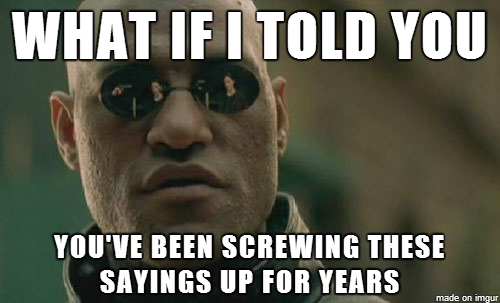The Red Pen is a series of tutorial/informational articles written by our editorial team here at Online Writing Jobs. If you notice grammatical mistakes in their writing, please circle the mistakes in red pen on your monitor and send us a screenshot. We will address it immediately.

English is an interesting and colorful language, and sometimes, we find ourselves using turns of phrase in our writing that we’ve spoken a million times but have never needed to write down. Often, idioms can include seldom-used or downright archaic words, and that can lead to spelling pitfalls. Here are some of my favorite commonly misspelled idioms:
- Champing at the bit: You’d think it would be “chomping at the bit,” but actually, the word “champ” has two meanings. Aside from the customary use of “champ” as short for “champion,” it’s also a verb meaning “to bite or chew on something noisily.” Think of an impatient horse with a bit in its mouth, eager to start a race — that’s where this expression comes from.
- Waiting with bated breath: If you’re waiting anxiously for something, you don’t have “baited breath” — that paints a funny picture for sure! The word “bated” derives from “abated,” and it means nearly the same thing: to reduce or restrain. It makes sense when you think about it: When you’re really anxious about something, you might suddenly realize that you’ve been holding your breath in anticipation.
- Getting their just deserts: If someone got what they should have, they probably didn’t get “desserts,” no matter how much they might’ve earned a cake or a pie. “Desert” is related to “deserve” — a desert is an earned reward or punishment.
- Wreak havoc: To “reek” is to smell really, really bad. To “wreck” is to destroy something. To “wreak” is to cause something; usually, we refer to wreaking havoc, but you could also wreak destruction, wreak vengeance… come to think of it, we pretty much never use this word in a positive light. Why doesn’t anyone ever wreak joy, or wreak celebration, or wreak victory? Who knows.
- Rack your brain: The word “rack” has a lot of uses, but the one we’re looking for here derives from the medieval torture device — when you rack someone, you torture them on the rack. Similarly, when you rack your brain, you’re torturing your brain — you’re stretching and straining it to try to remember something. This is easily confused with “wrack,” which actually means the same thing as “wreck,” either as a verb or a noun.
- While away the hours: We’re used to seeing “while” as a noun or conjunction referring to a period of time, but it can also be a verb, meaning “to cause to pass pleasantly.” On the other hand, “wile” means “to trick or entice” or can be used as a noun to mean “trickery.”
English is an old language, and along the way, it has picked up quite a few expressions that would’ve been more easily spelled when they were created. But before you get frustrated, remember that some of today’s idioms and slang will likely stick around and become just as confusing to future generations as the language evolves.
